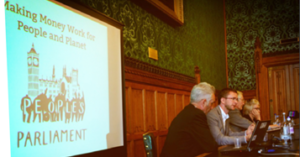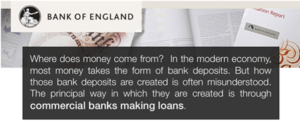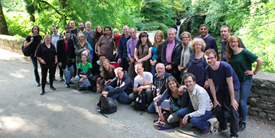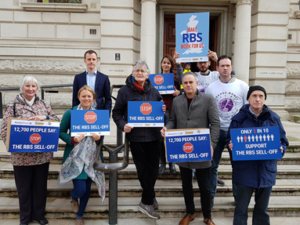It’s our 10 year anniversary!

We’ve come a long way and achieved a lot together since 2010 – but do you know how we got here? Check out our highlights from the last 10 years.
In 2010, with the world still reeling from the financial crash, mainstream commentators were wrongly laying the blame at the feet of a few reckless bankers and out-of-control government spending. But they’d missed something crucial – our broken money and banking system.
When Ben Dyson started a blog exposing the problems of our debt-based money system, little did he know that along with the 400 subscribers he quickly gained, he was starting a quiet revolution. Alongside activists and academics, Ben started developing draft legislation for the Independent Commission on Banking Reform and reaching out to MPs, but soon realized that to truly change our money and banking system, they’d need more than a few voluntary Positive Money heroes – they’d need a full-blown organisation.
Once formed, Positive Money set its sights on helping people learn how our money and banking system really works. In 2011 Andrew Jackson from Positive Money collaborated with Richard Werner, and Josh Ryan Collins and Tony Greenham from the New Economics Foundation, to write the book Where Does Money Come From? Where Does Money Come From?*, now used in economics courses across many universities. And not long after that, we were invited to host and speak at the All Party Parliamentary Group on Money, Economics and Banking, our first public political foothold!

2012 saw our public profile grow even further with the release of the documentary 97% owned which featured Positive Money staff, and soon prominent media figures including the Financial Times’ Martin Wolf, were helping to bring attention to the way money was created.
Not long after our local groups network got into full swing with meetings in London, Newcastle, Glasgow, Devon, Brighton, Nottingham and Edinburgh, to name just a few. Our grassroots groups thrived through monthly meetings and community outreach activities, and many continue today (albeit virtually). Head here to find and join a local group near you!
By 2013, the Bank of England’s quantitative easing programme was in full throttle. But the £445 billion it created increased inequality, making the rich richer and leaving little for the rest of us. So we started calling for public money creation (a.k.a direct monetary financing) to help people not financial markets, with our QE for People campaign. This was a relatively fringe idea at the time, but fast forward to April of this year and the Treasury, alongside Governor Andrew Bailey, are using this tool right now to directly finance government spending during the pandemic. Our unique combination of original research, media outreach and public pressure worked wonders, and proves persistence pays off. It may have taken six and a half years, but we’ve succeeded in putting monetary financing firmly on the policy map!

2014 marked our first big victory when a quiet quarterly bulletin from the Bank of England confirmed what we’d been saying all along about money creation in the UK:

And we soon spread this message even further when we worked with MPs to table the first parliamentary debate on money creation in over a century, strengthening political relationships that’d bloom in the years to come.
Our people-powered movement continued to grow in 2015, as we hosted a second supporter rural retreat and visited Glastonbury Festival. Then in the autumn, we joined Lord Adair Turner and 200 other leaders in politics, economics and civil society for a major event in Westminster on the future of monetary policy.


By 2016, our staff team had grown to six and we’d made our first trips to political party conferences. 2017 brought success on social media – our viral video, which called out Prime Minister Theresa May’s response to an NHS nurse asking for a pay rise, helped us spread the truth about the magic money tree like never before:
As we continued, we evolved and expanded our mission and vision: to reform our money and banking system so that it supports a fair, democratic and sustainable economy. As the leading organisation to emerge from the financial crash, we felt a responsibility to ensure integrity in our work, and became a values-led organisation, rather than a technocratic one. We embarked on new research and campaigns on the climate and ecological crises, the need to improve democracy and transparency in our central bank, and combat the inequalities that result from our current system. And with new tasks came new tools: stunts outside the Bank of England, opinion polls, and movement-building on social media.
In 2018, we celebrated the transformation of our QE for People campaign in the Eurozone, into a fully-fledged and impressive organisation in its own right: Positive Money Europe. We also launched The Money Question, a new home for debate and discussion about our money and banking system, and how to change it for the better.
2019 got off to an exciting start with our campaign win to help stop the government’s sell-off of RBS. We delivered our 12,000-strong joint petition with WeOwnIt and the New Economics Foundation to the Treasury with activists and Green Party politicians and soon celebrated the Labour party’s commitment to keeping RBS in public hands too.

Our success continued in the spring, when Mark Carney committed the Bank of England to disclosing the climate risk on its balance sheet – a change we’d called for just a year before in our groundbreaking report A Green Bank of England, paving the way for future victories on demanding our central bank step up to tackle the climate crisis.
Mobilising voters during last December’s general election helped us reach almost 25,000 candidates covering 70% of constituencies with our campaign on protecting access to cash, and our pressure pushed Chancellor Sunak to announce future legislation on the issue earlier this year.
Amidst Coronavirus, 2020 has undoubtedly been a year of turmoil – but we haven’t let that stop us. Alongside two new reports and several webinars, we’ve shined a light on the Bank of England’s corporate bailout scheme. We won our first transparency campaign around the Covid Corporate Financing Facility back in March and since then, we’ve continued calling them out on the lack of social and environmental conditions, most recently last week in Parliament’s Environmental Audit Committee hearing.
So…can you believe all this started with just a blog?
With a UK staff team of 10, a host of experienced board directors, a recently reinvigorated advisory panel, and 25,000 Positive Money heroes around the UK, we can’t wait to see what the next ten years will bring. And the biggest thanks goes to you, for all your support – we wouldn’t be here without you.
*Please note: we previously wrongly claimed to have published the book Where Does Money Come From? with the New Economics Foundation. This sentence was corrected on 19/10/20.